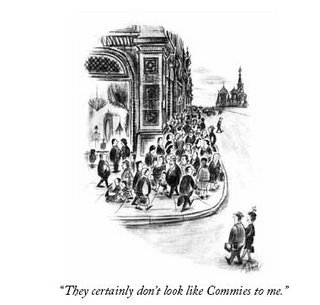Gore Vidal: “ Fifty years ago, Harry Truman replaced the old republic with a national-security state whose sole purpose is to wage perpetual wars, hot, cold, and tepid. Exact date of replacement? February 27. 1947. Place: White House Cabinet Room. Cast: Truman, Undersecretary of State Dean Acheson, a handful of congressional leaders. Republican senator Arthur Vandenberg told Truman that he could have his militarized economy only if he first "scared the hell out of the ,American people" that the Russians were coming. Truman obliged. The perpetual war began. Representative government of, by, and for the people is now a faded memory.”
Harry Truman: “The attempt of Lenin, Trotsky, Stalin, et all. To fool the world and the American Crackpots Association, represented by Jos. Davies, Henry Wallace, Calude Pepper, and the actors and artists in immoral Greenvich village, is just like Hitler’s and Mussolini’s so-called social states”
And thus began one of the worst chapters in human history - McCarthyism (the late 1940s to the late 1950s).
After Russians, it has been turn of Japanese, Chinese and now Islamists. Some day even Indians may qualify.
 Artist : Kenneth Mahood Publication: The New Yorker 27 Aug 1960
Artist : Kenneth Mahood Publication: The New Yorker 27 Aug 1960